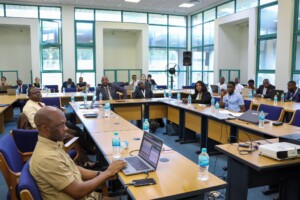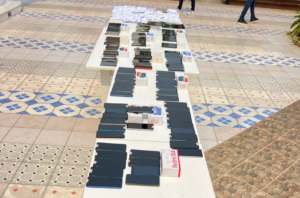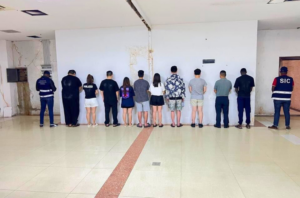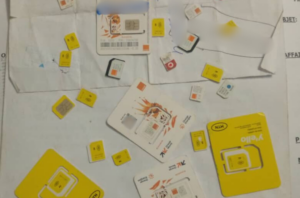Breaking News: Major INTERPOL Operation Serengeti Arrests 1,006 Criminals In 19 Countries
Major INTERPOL and AFRIPOL Cybercrime Operation Serengeti Nets 1,006 Suspects
Primary Category: Crimes & Criminals
Authors:
• SCARS Editorial Team – Society of Citizens Against Relationship Scams Inc.
• Portions from INTERPOL
About This Article
Operation Serengeti: A Landmark Cybercrime Crackdown Across Africa: In a major collaborative effort, INTERPOL and AFRIPOL conducted Operation Serengeti from September to October 2024, resulting in the arrest of 1,006 suspects and the dismantling of 134,089 malicious infrastructures across 19 African countries. The operation targeted a range of cybercrimes, including ransomware, business email compromise (BEC), digital extortion, and online scams, as identified in the 2024 Africa Cyber Threat Assessment Report.
The operation identified over 35,000 victims, with total financial losses linked to these crimes nearing $193 million globally. Key arrests included perpetrators of online investment scams, Ponzi schemes, credit card fraud, and human trafficking schemes tied to multi-level marketing scams. For example, Kenyan authorities uncovered a $8.6 million credit card fraud ring, while Cameroonian officials exposed a scheme that trafficked victims and forced them into recruiting others under false pretenses.
Private sector partners and cybersecurity firms played a vital role by providing intelligence, securing infrastructure, and aiding law enforcement. The operation demonstrates the power of international collaboration in disrupting cybercrime networks, with INTERPOL and AFRIPOL vowing to continue targeting these threats as they evolve.

![c40a332460f6-23COM002986-CYBER_-Africa-Cyber-Surge-II-Operation_Infographic_2023-08_infographic_HR-1-[1] BREAKING NEWS: Major INTERPOL Operation Serengeti Arrests 1,006 Criminals In 19 Countries - 2024](https://scamsnow.com/wp-content/uploads/2024/11/c40a332460f6-23COM002986-CYBER_-Africa-Cyber-Surge-II-Operation_Infographic_2023-08_infographic_HR-1-1-scaled.jpg)
Major INTERPOL and AFRIPOL Cybercrime Operation Serengeti Nets 1,006 Suspects
Empowering law enforcement and partners to disrupt cybercrime networks
Authorities across 19 African countries have arrested 1,006 suspects and dismantled 134,089 malicious infrastructures and networks thanks to a joint operation by INTERPOL and AFRIPOL against cybercrime.
Operation Serengeti (2 September – 31 October) targeted criminals behind ransomware, business email compromise (BEC), digital extortion and online scams – all identified as prominent threats in the 2024 Africa Cyber Threat Assessment Report.
More than 35,000 victims were identified during the operation, with cases linked to nearly USD 193 million in financial losses worldwide.
Information provided by participating countries of ongoing cases with INTERPOL fed into 65 Cyber Analytical Reports that were produced to ensure actions on the ground were intelligence-led and focused on the most significant actors.
Private sector partners, including Internet Service Providers, also played a vital role by sharing intelligence, supporting analysis and disrupting criminal activities. They provided on-site support and offered round-the-clock remote assistance to patch vulnerabilities and secure critical infrastructure for the participating member countries.
Valdecy Urquiza, Secretary General of INTERPOL, said:
“From multi-level marketing scams to credit card fraud on an industrial scale, the increasing volume and sophistication of cybercrime attacks is of serious concern.
“Operation Serengeti shows what we can achieve by working together, and these arrests alone will save countless potential future victims from real personal and financial pain. We know that this is just the tip of the iceberg, which is why we will continue targeting these criminal groups worldwide.”
Ambassador Jalel Chelba, AFRIPOL’s Executive Director said:
“Through Serengeti, AFRIPOL has significantly enhanced support for law enforcement in African Union Member States. We’ve facilitated key arrests and deepened insights into cybercrime trends. Our focus now includes emerging threats like AI-driven malware and advanced attack techniques.”
National case studies
In Kenya, officers cracked a case of online credit card fraud linked to losses of USD 8.6 million. The funds, stolen through fraudulent scripts run after altering the banking system’s security protocol, were promptly redistributed by the group via SWIFT to companies in the United Arab Emirates, Nigeria and China and subsequently, to digital asset institutions offering trading and financial services regulated in multiple jurisdictions. Nearly two dozen arrests have been made so far.
Eight people, including five Chinese nationals, were arrested in Senegal for a USD 6 million online Ponzi scheme affecting 1,811 victims. A search of their apartment uncovered over 900 SIM cards, USD 11,000 in cash, phones, laptops, and copies of victims’ ID cards.
Nigerian authorities arrested a man accused of running online investment scams. He is believed to have made upwards of USD 300,000 by luring victims through messaging platforms with false promises of cryptocurrency returns.
In Cameroon, authorities arrested a group suspected of trafficking victims from seven different countries to run a multi-level marketing scam. After paying a “membership fee”, victims were promised employment opportunities or training but once in Cameroon, they were held captive and obliged to lure others into the scheme to gain their freedom. Initial estimates show that the group had already pocketed at least USD 150,000 in fees.
Angolan investigators dismantled an international criminal group running a virtual casino in Luanda. The group, which primarily targeted Brazilian and Nigerian gamblers, defrauded hundreds through its online platform, offering a percentage of winnings to members who recruited new subscribers. Some 150 arrests were made, with officers seizing 200 computers and more than 100 mobile phones.
Operation Serengeti was carried out with funding of the UK’s Foreign, Commonwealth and Development Office, the German Federal Foreign Office and the Council of Europe.
Participating Countries:
Algeria, Angola, Benin, Cameroon, Côte d’Ivoire, Democratic Republic of the Congo, Gabon, Ghana, Kenya, Mauritius, Mozambique, Nigeria, Rwanda, Senegal, South Africa, Tanzania, Tunisia, Zambia, Zimbabwe
Operational Partners:
Cybercrime Atlas, Fortinet, Group-IB, Kaspersky, Team Cymru, Trend Micro, Uppsala Security
-/ 30 /-
What do you think about this?
Please share your thoughts in a comment below!
-/ 30 /-
What do you think about this?
Please share your thoughts in a comment below!
Important Information for New Scam Victims
- Please visit www.ScamVictimsSupport.org – a SCARS Website for New Scam Victims & Sextortion Victims.
- SCARS Institute now offers its free, safe, and private Scam Survivor’s Support Community at www.SCARScommunity.org – this is not on a social media platform, it is our own safe & secure platform created by the SCARS Institute especially for scam victims & survivors.
- SCARS Institute now offers a free recovery learning program at www.SCARSeducation.org.
- Please visit www.ScamPsychology.org – to more fully understand the psychological concepts involved in scams and scam victim recovery.
If you are looking for local trauma counselors, please visit counseling.AgainstScams.org
If you need to speak with someone now, you can dial 988 or find phone numbers for crisis hotlines all around the world here: www.opencounseling.com/suicide-hotlines
Statement About Victim Blaming
Some of our articles discuss various aspects of victims. This is both about better understanding victims (the science of victimology) and their behaviors and psychology. This helps us to educate victims/survivors about why these crimes happened and not to blame themselves, better develop recovery programs, and help victims avoid scams in the future. At times, this may sound like blaming the victim, but it does not blame scam victims; we are simply explaining the hows and whys of the experience victims have.
These articles, about the Psychology of Scams or Victim Psychology – meaning that all humans have psychological or cognitive characteristics in common that can either be exploited or work against us – help us all to understand the unique challenges victims face before, during, and after scams, fraud, or cybercrimes. These sometimes talk about some of the vulnerabilities the scammers exploit. Victims rarely have control of them or are even aware of them, until something like a scam happens, and then they can learn how their mind works and how to overcome these mechanisms.
Articles like these help victims and others understand these processes and how to help prevent them from being exploited again or to help them recover more easily by understanding their post-scam behaviors. Learn more about the Psychology of Scams at www.ScamPsychology.org
SCARS INSTITUTE RESOURCES:
If You Have Been Victimized By A Scam Or Cybercrime
♦ If you are a victim of scams, go to www.ScamVictimsSupport.org for real knowledge and help
♦ SCARS Institute now offers its free, safe, and private Scam Survivor’s Support Community at www.SCARScommunity.org/register – this is not on a social media platform, it is our own safe & secure platform created by the SCARS Institute especially for scam victims & survivors.
♦ Enroll in SCARS Scam Survivor’s School now at www.SCARSeducation.org
♦ To report criminals, visit https://reporting.AgainstScams.org – we will NEVER give your data to money recovery companies like some do!
♦ Follow us and find our podcasts, webinars, and helpful videos on YouTube: https://www.youtube.com/@RomancescamsNowcom
♦ Learn about the Psychology of Scams at www.ScamPsychology.org
♦ Dig deeper into the reality of scams, fraud, and cybercrime at www.ScamsNOW.com and www.RomanceScamsNOW.com
♦ Scam Survivor’s Stories: www.ScamSurvivorStories.org
♦ For Scam Victim Advocates visit www.ScamVictimsAdvocates.org
♦ See more scammer photos on www.ScammerPhotos.com
You can also find the SCARS Institute’s knowledge and information on Facebook, Instagram, X, LinkedIn, and TruthSocial
Psychology Disclaimer:
All articles about psychology and the human brain on this website are for information & education only
The information provided in this and other SCARS articles are intended for educational and self-help purposes only and should not be construed as a substitute for professional therapy or counseling.
Note about Mindfulness: Mindfulness practices have the potential to create psychological distress for some individuals. Please consult a mental health professional or experienced meditation instructor for guidance should you encounter difficulties.
While any self-help techniques outlined herein may be beneficial for scam victims seeking to recover from their experience and move towards recovery, it is important to consult with a qualified mental health professional before initiating any course of action. Each individual’s experience and needs are unique, and what works for one person may not be suitable for another.
Additionally, any approach may not be appropriate for individuals with certain pre-existing mental health conditions or trauma histories. It is advisable to seek guidance from a licensed therapist or counselor who can provide personalized support, guidance, and treatment tailored to your specific needs.
If you are experiencing significant distress or emotional difficulties related to a scam or other traumatic event, please consult your doctor or mental health provider for appropriate care and support.
Also read our SCARS Institute Statement about Professional Care for Scam Victims – click here
If you are in crisis, feeling desperate, or in despair, please call 988 or your local crisis hotline – international numbers here.
More ScamsNOW.com Articles
A Question of Trust
At the SCARS Institute, we invite you to do your own research on the topics we speak about and publish. Our team investigates the subject being discussed, especially when it comes to understanding the scam victims-survivors’ experience. You can do Google searches, but in many cases, you will have to wade through scientific papers and studies. However, remember that biases and perspectives matter and influence the outcome. Regardless, we encourage you to explore these topics as thoroughly as you can for your own awareness.

























![NavyLogo@4x-81[1] BREAKING NEWS: Major INTERPOL Operation Serengeti Arrests 1,006 Criminals In 19 Countries - 2024](https://scamsnow.com/wp-content/uploads/2025/04/NavyLogo@4x-811.png)










![scars-institute[1] BREAKING NEWS: Major INTERPOL Operation Serengeti Arrests 1,006 Criminals In 19 Countries - 2024](https://scamsnow.com/wp-content/uploads/2025/04/scars-institute1.png)

![niprc1.png1_-150×1501-1[1] BREAKING NEWS: Major INTERPOL Operation Serengeti Arrests 1,006 Criminals In 19 Countries - 2024](https://scamsnow.com/wp-content/uploads/2025/04/niprc1.png1_-150x1501-11.webp)